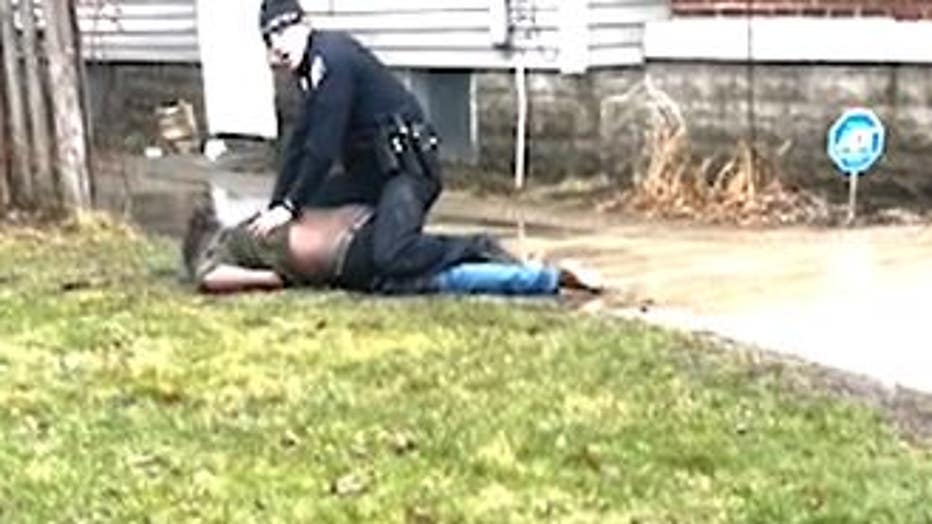Patrick Lyoya shooting: What charges the Grand Rapids police officer could face

Charlie Langton explains why Grand Rapids officer violated policy in Patrick Lyoya shooting
When Patrick Lyoya was shot by a Grand Rapids Police Officer earlier this month, attorney and FOX 2 legal analyst Charlie Langton said the officer likely violated policy multiple times during the traffic stop and ultimate shooting.
DETROIT (FOX 2) - The shooting by a Grand Rapids Police Officer of Patrick Lyoya has stunned the state of Michigan and sent shockwave across the nation after video was released on Wednesday revealed the officer shot the 26-year-old in the back of the head.
Lyoya was shot to death on April 4 by a Grand Rapids Police Officer after the two fought as the officer pulled him over for a license plate violation. In video released by authorities, the officer can be heard explaining that he pulled Lyoya over because the license plate on the car he was driving belonged on a different car.
Watch live at 1:30: Patrick Lyoya's family, Ben Crump to hold Thursday press conference
In the video, Lyoya and the unnamed officer fought over a Taser before the officer pulled out his service weapon and shot him in the back of the head.
The officer has been placed on paid leave while the Michigan State Police investigate the shooting.
Civil rights attorney Ben Crump has called for the officer to be fired and charged for Lyoya's death. The decision on criminal charges will ultimately be made by MSP and the Kent County Prosecutor's Office.
Attorney and FOX 2 legal analyst Charlie Langton broke down the potential charges in the shooting of Lyoya. He explained that, in Michigan, whenever there's an officer-involved shooting, another agency investigates it.
In this case, it's MSP.
"They're looking for - what's the protocol? In this situation, and obviously the videos…they're looking for the protocol," Langton said.
More: Here's what the Patrick Lyoya shooting videos showed
But before they get to that, Langton said they need to look into what started the interaction with police.
"Why was he stopped? He was stopped for a bad license plate. At best that's a misdemeanor. Even if he's guilty of that - it's a misdemeanor. It's not that big a deal, OK? If that's the case, I found - in the Michigan State Police officers guide specifically - you do not ever use lethal force in that situation, even if the guy runs. You let him run," Langton said.
While Langton doesn't know all the facts, he did review the protocol for the Michigan State Police and Detroit Police Departments, which will have similar procedures as Grand Rapids. In both of those protocols, the procedure for a misdemeanor - like a traffic offense - is to let the suspect run.
"Especially you let the guy run in this case with a passenger in the car. This guy can't go too far. The passenger's gonna probably cooperate. And even the worst case scenario - it's a misdemeanor for a bad license plate," Langton said.

As for the argument that Lyoya had to talk with the officer, Langton says the officer still didn't follow proper procedure
"All protocols says first, police officers should use deescalating procedures; you talk to him, you reason with him. I don't know if the officer did that. I don't know. No. 2: you then use non-lethal force. A stun guard, a Taser - which he tried and failed," Langton said.
But at the end, with Lyoya under the officer, this is when Langton said he went too far.
"He was on top of him. So he can't go too far. This is again non-lethal. And then if that doesn't work and the officer feels that his life is in danger - an officer can use lethal force," Langton said.
As MSP investigates, Langton said the officer could face manslaughter charges in Lyoya's death. The next step when MSP finishes its investigation is to make a recommendation on charges and then take it to the Kent County Prosecutor, who will then make a charging decision.
"From what I know - I don't know all the facts - I think some protocol was violated here. It went beyond what should have happened, given all the circumstances," Langton said.
During "The Verdict" on Thursday, FOX 2's Lee Thomas weighed in that the officer should have called for backup and let Lyoya run.
"The guy should have called for backup and let him run. There are so many things you can say in hindsight but the one thing you can say is he did not need to shoot that young man. It looks that my opinion I'm not a lawyer. I'm not involved, but that is a one to watch, it's a tough one to live through again, It's - this is a tough one," Thomas said.
But the criminal charges are just part of what is to come. There's also the likelihood of a civil suit.
The family has hired Crump as well as Detroit-area attorney Ven Johnson and both will team up for possible civil cases. The two cases are not related in court, but either one could influence the other, depending on the results.
Langton said the release of the video does not help the officer at all.
"But in this one, there's a lot of video and I don't think it helps the police officers, but it is the video and good for them that they did release it and that they're transparent. But let's not make a judgment yet, wait until all the facts get in," Langton said.

